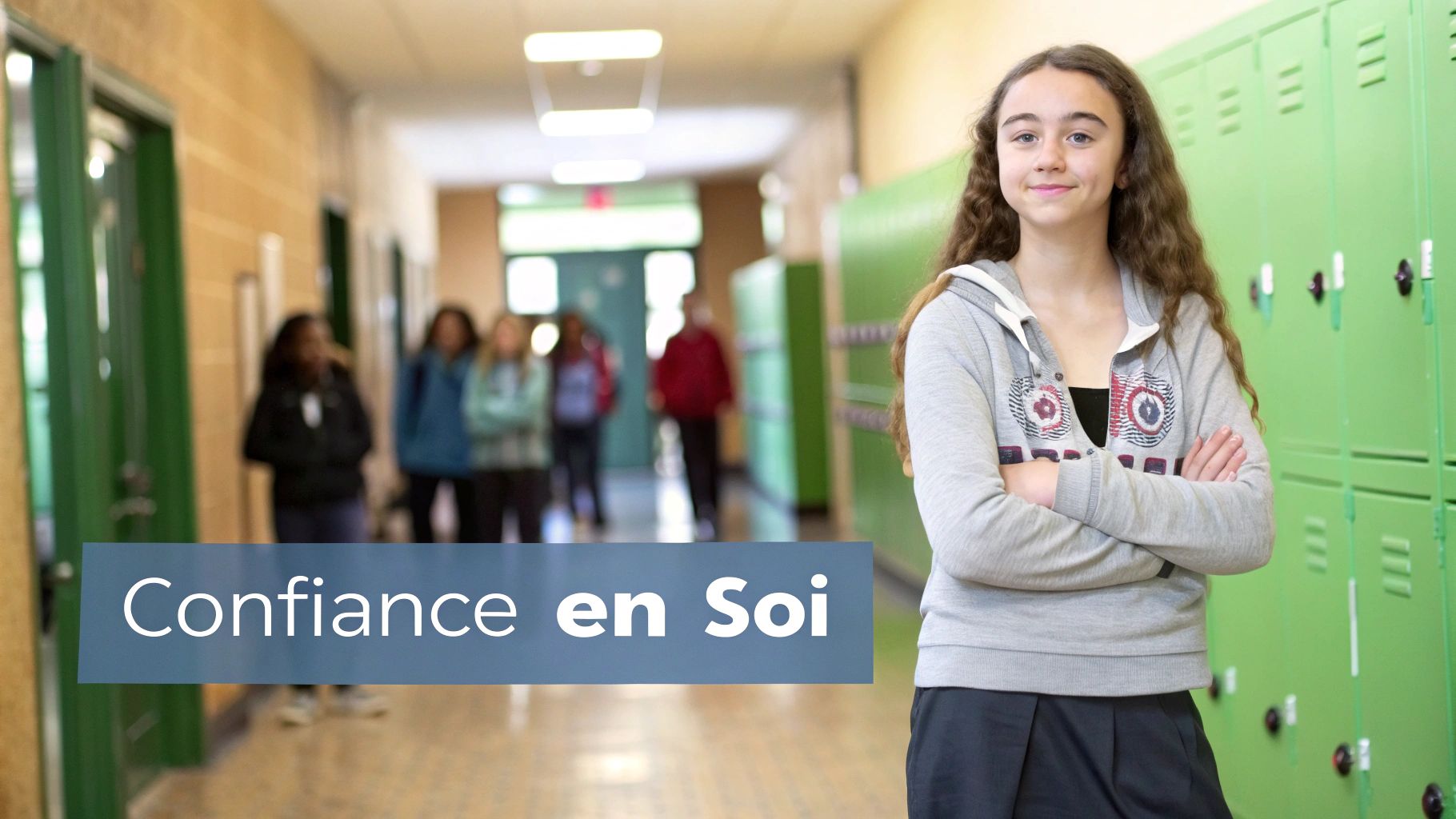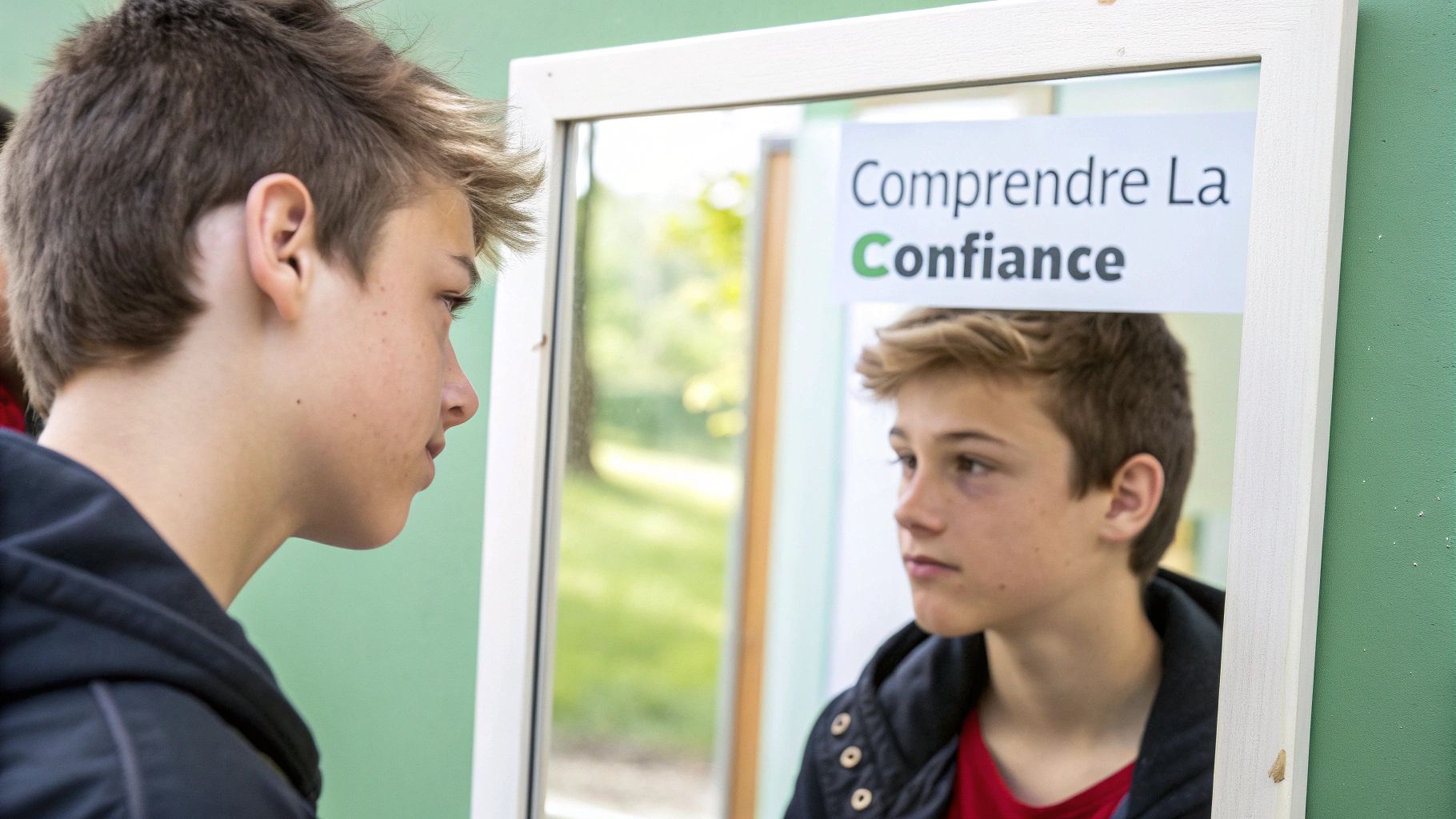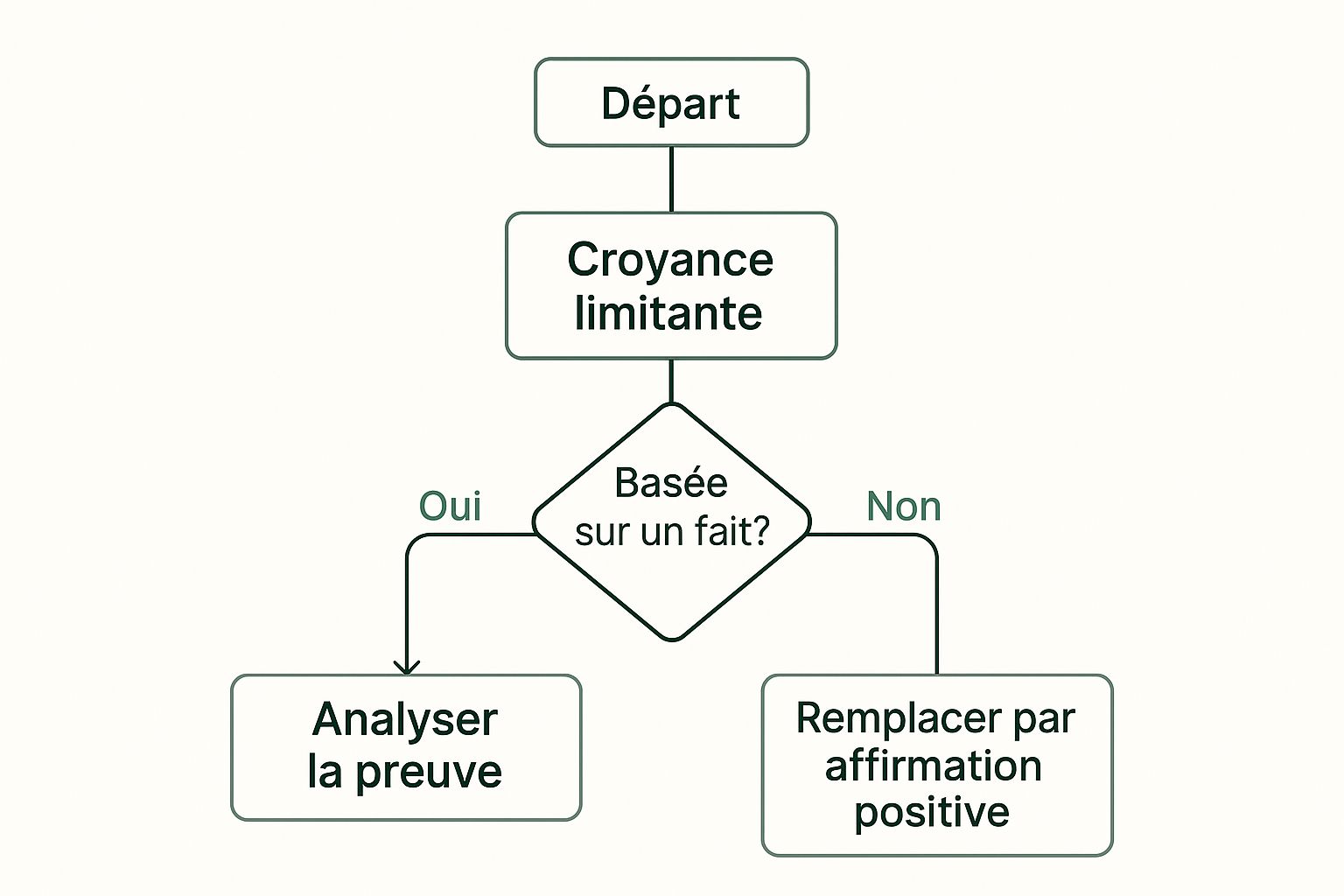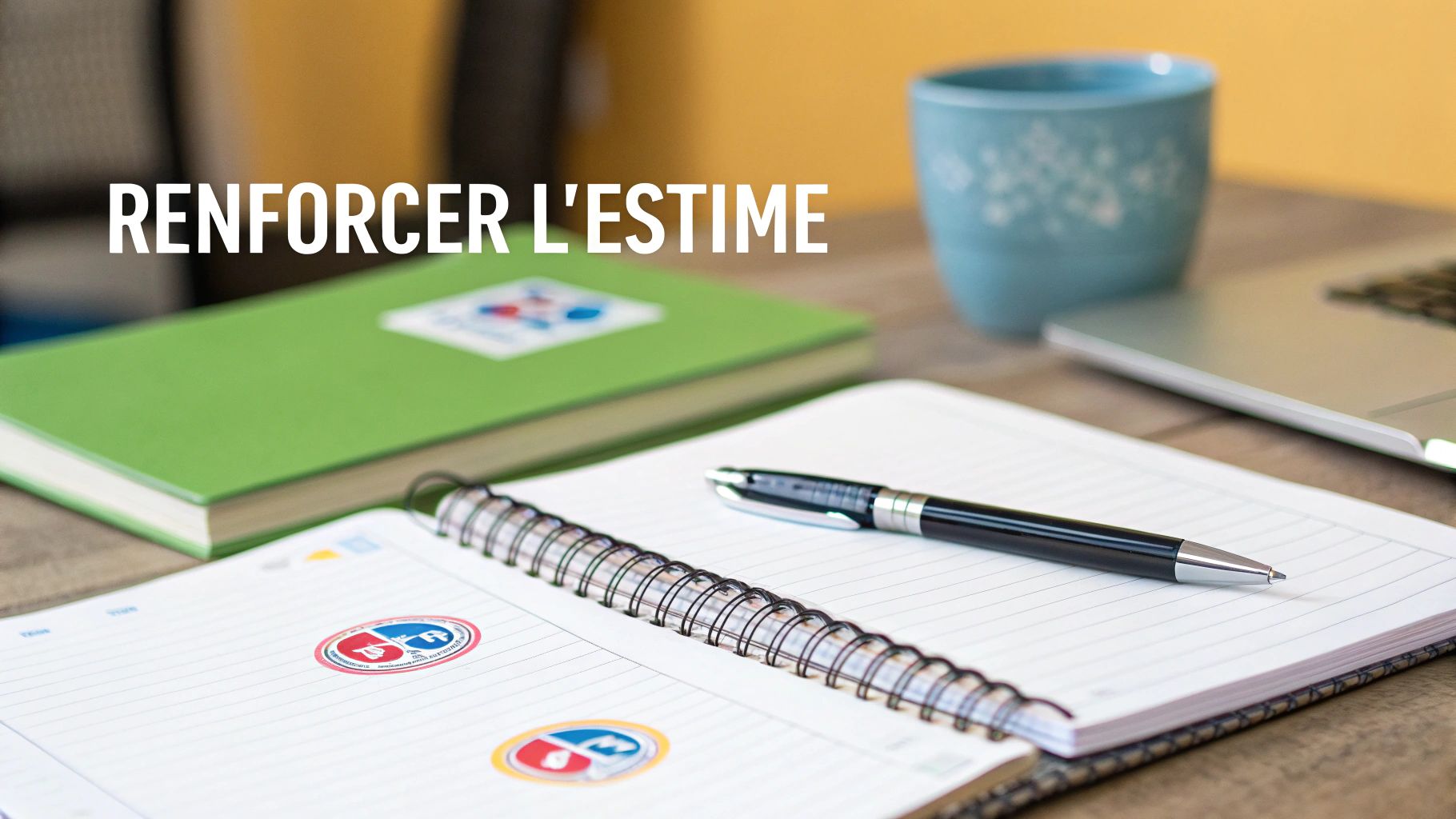Finding the right self-confidence book for your teen can be a real gift, especially during this pivotal time of uncertainty and change. It's like giving them a discreet but incredibly effective compass to help them feel understood, less alone, and better equipped to face the challenges ahead.
Why is a book such a good ally for your child's confidence?
Adolescence is a time when self-doubt can quickly become a mountain of uncertainty. Between school pressure, the image projected by social media, and bodily changes, it's not always easy for a young person to find their place. This is precisely where a well-chosen book can play a vital supporting role.
A book isn't a screen. It's a refuge, a calm space where your child isn't judged. It allows them to immerse themselves in stories or reflections that resonate with what they're experiencing. When they recognize themselves in a character who faces their fears or discover concrete advice they can apply, it's like seeing themselves in a mirror that reflects a positive image of themselves.

A helping hand to open dialogue within the family
For you, as a parent, a self-confidence book for teens is also a great way to build a bridge. It can open the door to discussions your child might never dare to start on their own. Talking about a chapter or situation in the book is a gentle way to get them to share what's on their mind without putting them on the spot.
The book is a constant support, but never intrusive. It's there, on her bedside table, available at any time. A silent and reassuring presence.
A book is a kind of inner compass. It doesn't provide all the answers, but it does offer directions and clues to help a young person navigate the sometimes choppy waters of life with greater confidence and serenity.
A reality that the figures do not hide
This quest for confidence is far from an isolated case. A recent study revealed a sobering figure: more than 8 out of 10 young people give up on their dreams due to a lack of self-confidence. This is even more pronounced among girls and young people from priority education areas, where the figure rises to 86% .
The impact is very real: 43% of young people even avoid choosing a career path they like, simply for fear of not succeeding. If you want to delve deeper into the subject, you can consult the complete study on young people's aspirations .
These statistics show us how essential it is to take action. A book can be that first step, that little spark that helps your teen believe in themselves and dare to take the leap.
Understanding the challenges that undermine young people's confidence
Adolescence is a bit like a great sea voyage. The boat is under construction, the weather is constantly changing, and emotions are real waves that can shake anyone. For many young people, this is a time when self-confidence, that little inner compass, is particularly fragile. To help them navigate, the first step is to understand what's stirring their ocean.

Think of self-confidence as a small flame. During adolescence, several strong winds threaten to extinguish it. These winds are challenges that sometimes seem invisible to us parents, but which constantly blow through their daily lives.
The impact of body image and social media
Today, social media is a constant window into an idealized world. Bodies are perfect, lives seem flawless. Your teen is bombarded by these images, which can create a very painful disconnect from their own reality, their own doubts. This constant comparison is the perfect breeding ground for insecurities.
A simple comment or the number of "likes" can be experienced as a real rejection. This digital validation then becomes a very unstable barometer of their personal value.
Fear of being judged by others is undoubtedly one of the greatest obstacles to personal growth. It paralyzes, prevents us from taking risks and, above all, from simply being ourselves.
A young person who no longer dares to raise their hand in class for fear of making a mistake, or who cancels an outing for fear of not being "well enough" dressed, is the perfect illustration. Each situation is a small crack that weakens the wall of their confidence.
Academic pressure and fear of failure
School is another minefield for confidence. The pressure of grades, the immense question of career path, and the expectation of success can become a source of enormous anxiety. Failure, even minor, is often seen as a verdict on their overall abilities.
And this anxiety isn't just a feeling. A recent study showed that by 2023, nearly one in three teenagers suffered from a generalized anxiety disorder . This very strong link between anxiety and low self-esteem shows us how vital it is to offer them the right support. If you want to dig deeper, you can explore the full data from the Teen Barometer.
For us parents, it is essential to defuse these situations. Here are some practical tips:
- Validate their emotions: Instead of saying "don't worry," try an approach like "I understand that this situation is difficult for you." This shows them that their feelings are legitimate.
- Celebrate effort, not just results: Highlight their perseverance and courage. "I saw all the effort you put into preparing for this presentation, I'm proud of you."
- Share your own experiences: Tell him about a time you doubted yourself at the same age. This normalizes his fears and shows him that he's not alone.
Understanding that these challenges are real is the foundation for providing sincere and effective support. A self-confidence book for teens can then become a valuable tool, as it puts into words what they are experiencing and, above all, shows them that they are not alone.
How to Choose the Perfect Book for Your Teen
Finding the right book on self-confidence for teens is no easy feat. To prevent it from gathering dust on a shelf, it needs to truly resonate with your child. The idea is to turn this purchase into a thoughtful gesture, a helping hand that will guide them in the right way.
To achieve this, the secret is to start with him, his passions, and his personality. This is the best guarantee that the message will get through and that he will really want to dive into it.
Start from your interests
The easiest way to approach a topic as personal as self-confidence is to tap into what already motivates you. A book that resonates with your passions will have infinitely more impact.
- For a sporty teen: Imagine the effect of a novel about an athlete overcoming his doubts or a biography of a champion. A true source of inspiration!
- For a creative mind: A practical guide to overcoming writer's block or a notebook filled with exercises to unleash your creativity could be the trigger you're waiting for to dare to express yourself.
- For a gamer: A story where the hero uses strategies to assert himself in a virtual (or real) world will create a powerful and accessible parallel for him.
By building on familiar ground, you show him that self-confidence is not an abstract concept, but rather a skill that can be applied concretely to what matters to him.
Choose a suitable format and tone
The format of the book is as crucial as its content. A teenager who isn't a big reader will quickly be discouraged by a large theoretical tome. Fortunately, there are a multitude of options to find the right self-confidence book for teenagers .
Here's a visual that nicely illustrates the kind of exercises often found in these books to help deconstruct a limiting belief. It's a tool you could even try together.

This little decision tree shows a very concrete method for analyzing your own thoughts, a key step in feeling more solid.
The tone, too, must be chosen carefully. Some teens will be more affected by a humorous tone that plays down the situation , while others will need a gentle and empathetic approach.
The goal isn't to impose a reading, but rather to offer a tool that your child will feel comfortable with. Observe their personality: are they sensitive to humor, touching stories, or do they need concrete advice?
A table to help you see things more clearly
To help you make this choice, here's a quick table that summarizes the options based on your teenager's profile. It should help you quickly identify what might best suit them.
What type of book for which teenager?
This chart helps parents choose the book format best suited to their teen's personality and needs.
| Book type | Ideal for... | Example approach |
|---|---|---|
| The initiatory novel | A teenager who likes to escape and identify with strong characters. | Follow a hero who goes through similar trials and finds the strength to overcome them. |
| The practical guide | A teenager who needs concrete tools and actions to put in place. | Offer exercises, challenges and practical sheets to take action on a daily basis. |
| The comic strip | A more visual reader or one who is intimidated by long texts. | Tell a story or give advice with illustrations that make the message more accessible. |
| The interactive notebook | A young creative who needs to take ownership of the content by writing and drawing. | Provide pages to fill in to help him explore his own thoughts and emotions. |
I hope that this little guide will help you find that rare gem, the one who will really speak to your teenager and give them the keys to moving forward with more serenity.
Our selection of books to inspire confidence
Looking for the perfect self-confidence book for teens ? To help you find the right book, we've prepared a diverse selection. Far from being a simple list, our goal is to show you why each book is a good choice, what challenge it helps overcome, and what message it can convey to your child.
Every teen is different. That's why we offer a little bit of everything: inspiring novels, practical guides filled with exercises, and even creative formats that remind you that you're never alone when it comes to your doubts.

Stories to identify with and move forward
Novels are a wonderful way to approach self-confidence without it seeming like it. By following a hero as he faces his fears, your teen can relate and better understand his own emotions through the adventures of another.
Children's literature is increasingly addressing these topics. Take Isabelle Pandazopoulos's "Ask Them for the Moon," which follows four young people whose confidence has been shattered by academic failure. Their teacher helps them rebuild their lives through writing, showing how a passion can become a real driving force. If this kind of approach interests you, you can discover other books to help young people .
Practical guides to take action
For teens who need something concrete, there's nothing like a practical guide. These books don't just talk; they provide tools, challenges, and do-it-yourself activities.
A good practical guide is like a toolbox for the mind. It gives teens concrete keys to better understand themselves, manage their stress, and dare to take their place, step by step.
These books often address very real issues that concern young people today.
- Managing peer pressure : Exercises to learn how to say no and be yourself.
- Coping with online harassment : Tips to protect yourself and maintain your self-esteem.
- Learn to assert yourself : Simple techniques for daring to speak out and defend your ideas.
Creative formats to explore your emotions
Beyond novels and guides, there are other very effective formats. Interactive notebooks, for example, are a great idea. They invite teens to become the authors of their own thinking. By writing, drawing, or answering questions, they make concepts their own and explore their inner world in a fun way.
This approach makes reading much more personal and engaging. It's a gentle and powerful way to help them recognize their own worth and build confidence that truly comes from within.
What if the best book about self-confidence wasn't the one that told someone else's story, but the one where your teen was the hero? The idea is simple, but it changes everything. Imagine your child discovering themselves in the pages of an adventure, not as a spectator, but as a central character, courageous and resourceful. It's an incredibly powerful mirror effect.
With this approach, reading becomes an intimate, personal, and empowering experience. Rather than simply reading advice, your teen experiences it through their own character.
Your teenager becomes the hero of their own story
The principle of a personalized book, like those found at My Book Story , is based on a well-known psychological mechanism: positive visualization. When a young person sees themselves succeeding, even in a story, they program their brain to believe it for real.
The simple act of creating the book with you can become a precious family ritual. By choosing their qualities, strengths, and the challenges they want to take on, the teenager gently embarks on a journey of self-exploration. The goal isn't to judge themselves, but to rediscover themselves with kindness.
The benefits of a truly personal approach
This personalization is far from being a simple gimmick. It has concrete and lasting effects on building a young person's self-esteem.
- He feels understood: The story can echo his own doubts. This shows him that he has the right to feel them and, above all, that he has within himself the keys to overcome them.
- His identity is strengthened: By showcasing his passions and what makes him unique, the book helps him build a positive image of himself, far from external pressure.
- He has concrete support: The book becomes a refuge. A tangible reminder of his own worth that he can flip through when his spirits are low.
A personalized book isn't just a story. It's a mirror that holds up to the teen the image of the best version of themselves, a constant reminder of their potential and the strength they have within.
Making self-confidence less abstract
For a teenager, talking about "self-confidence" can quickly seem vague and theoretical. A book in which they are the hero suddenly makes this concept very concrete. We're no longer talking about a to-do list, but an adventure to be experienced.
For example, instead of reading a chapter explaining what courage is, he will read a scene where his own character demonstrates courage. The identification is immediate and the impact, much stronger. This book becomes a precious memory, a personal treasure that reminds him of who he is and all he is capable of. It is a creative, gentle, and terribly effective companion.
We answer your questions about self-confidence and reading
Finding the right book for your teenager inevitably raises a lot of questions. And that's completely normal! As parents, we want to make the best possible choice. This FAQ is here to enlighten you with simple answers and concrete advice.
The idea is to guide you without any hassle and to give you ideas so that reading becomes a real plus for your teenager.
How long does it take to see results?
Let's be honest, there's no magic formula. Self-confidence is like a garden: it's cultivated day after day. A book can plant the first seeds, but the effects aren't always instantaneous.
The most important thing is not speed, but regularity. Inviting your child to read a few pages before bed can become a soothing ritual. Think of the book as a companion, not a quick fix.
My teenager hates reading, what should I do?
If your teen is turning their noses up at books, forcing them will only make things worse. The key is to find alternative ways to incorporate reading in a fun way.
Reading should never be a chore. If the classic novel isn't going down well, it's time to try more creative formats that will.
Here are some ideas to replace the traditional book:
- Comics or graphic novels : The image makes the story much easier to approach.
- Audiobooks : Perfect for listening to a story with the family during a car ride.
- Interactive notebooks : They make him an actor by inviting him to write, draw, and think.
The goal is to find what fits your personality. A self-confidence book for teens can take many different forms; you just have to find the one that appeals to them.
How do you know if the book has a positive effect?
The impact of a book isn't always seen in grand speeches. Often, it's in the small details of everyday life that we see change.
Keep your eyes peeled! Your teen may be daring to try a new activity, expressing their opinion a little more firmly, or handling a stressful situation more calmly. These are the small victories that show that something positive is happening within them.
To learn more, you can also casually start the discussion: "What did you think of this character? Does it remind you of anything?" Their answers are great clues to understand how they're integrating the book's messages. Every little bit of progress is an achievement worth encouraging.
Give your child a unique tool to explore their emotions and build their confidence every day. The My Book Story notebook makes writing and drawing a truly personal adventure.
Discover The My Book Story Notebook and begin the journey to self-confidence


